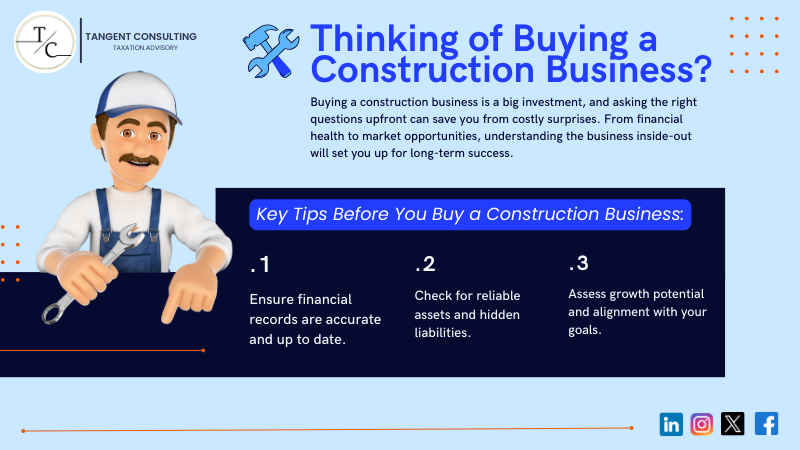Buying a Construction Business? Ask these 5 Questions First
Buying a Construction Business? Ask these 5 Questions First

It’s Monday morning again (and it’s pretty cold). Yesterday, we were reading a business article, and on the sidebar, we found a Google Ad for a “construction business for sale.”
We clicked and went to the listing, and while we were looking at the listing, we noticed a few hiccups. We aren’t construction gurus, but our experience tells us that buying a construction business can be really hard, so it suddenly prompted an idea for today’s blog topic.
In this guide, we’ll break down the five key questions you need to ask before buying a construction business. If you don’t want your investment to crumble, stick with us for the next 10 minutes.

Buying a Construction Business
We know and have seen that buying a construction business can fast-track your entrepreneurial dreams, but it’s not without risks. You need to approach the purchase with proper planning and strategy.
So, let’s get straight to the point and discuss the key questions that can help you in buying a construction business.
1. What Type of Construction Business Do You Want to Buy?
Not all construction businesses are built in the same way—pun intended. The construction business is huge, and there are different types of businesses you need to look for.
The construction industry offers plenty of opportunities, from general contractors and specialty trades like electrical or plumbing to niche businesses or restoration.
So, how can you choose one?
Start by asking yourself these questions:
- What’s your expertise? Are you comfortable managing large-scale projects, or prefer niche services like plumbing or landscaping?
- What’s your target market? You can target residential, commercial, or industrial construction. Remember that each has its own challenges and profit margins.
- What’s the scope? Do you want a small business with a tight-knit crew or a larger operation with multiple job sites?
Pro Tip: Specialized construction businesses, like solar panel installation or smart home construction, are seeing rising demand. The global solar power market is expected to reach $430 billion by 2032.

2. What’s The Local Competition Like?
Before purchasing a construction business, it’s crucial to understand the competitive landscape in your target area. For example, the US construction industry is vast, with a market size valued at nearly $2 trillion in 2023. However, this broad figure doesn’t reflect local market conditions.
So, you need to identify how many construction firms operate locally. A saturated market may indicate fierce competition, potentially squeezing profit margins.
You also need to determine if the market is dominated by a few large players or consists of many small firms. In addition, assess whether competitors offer similar services or have unique specializations. Identifying gaps can help you position your business effectively.
Pro Tip: Utilize Porter’s Five Forces model to analyze the competitive environment. This model examines factors like the threat of new entrants, the bargaining power of suppliers and buyers, and the threat of substitutes, providing a comprehensive view of industry dynamics.

3. What are Your Financing Options?
Buying a construction business is a significant investment, and unless you’re paying in cash (lucky you!), you need to understand your financing options.
The good thing is you have a lot of financing options, like
- Banks often provide loans tailored for business acquisitions, but they typically require a strong credit history and detailed financial projections.
- In the US, SBA loans are popular for business acquisitions, offering lower interest rates and longer repayment terms. However, they require significant documentation, and approval timelines can be lengthy.
- If you have connections in the industry or access to venture capital, private investors might be willing to fund your acquisition in exchange for equity or profit-sharing.
- Online platforms like Fundera can provide quick financing options, though interest rates are typically higher than traditional banks.
Remember, buying the business is just the beginning. You also need to consider operations, marketing, and expansion costs. We have a detailed guide on construction business costs. So, make sure to check it out here, after reading this guide.

4. Have you Valued the Business?
Before committing to a construction business, you need to determine if the asking price reflects its true value. Overpaying can eat into your returns, while underestimating the business’s worth might lead to missed opportunities or hidden liabilities.
Here’s how you can value a business:
Review the business’s profit and loss statements, balance sheets, and cash flow reports. You’ll find an answer to questions like, are revenues stable? What about debt and liabilities?
- The value of machinery, tools, and even software licenses can significantly impact the overall worth. Ensure these assets are in good condition and properly documented.
- Consider the demand for construction services in the region. A business operating in a booming area may have a higher value than one in a declining market.
5. What About Logistics?
Owning a construction business isn’t just about paperwork; it’s about managing the nitty-gritty logistics. So you can run your business smoothly.
So, you need to ask questions like:
- Does the business have experienced employees and subcontractors?
- Are they under long-term contracts or at-will agreements?
- Are vehicles, machinery, and tools leased, owned, or financed?
- Do suppliers provide favorable terms and reliable deliveries?
- Does the business hold all necessary operations permits, certifications, and licenses?
- Is the business using digital tools/software for project management, accounting, and customer relationship management?

Tips for Buying a Construction Business
Imagine you’re assembling an IKEA table. The instructions look straightforward, but halfway through, you realize you’ve used the wrong screws. Buying a construction business can feel similar, but the good news is you can avoid the pitfalls of buying a construction business.
Here are some tips to keep your purchase on solid footing:
- Research the industry, the specific market, and the business you’re considering. Learn about its reputation, track record, and customer reviews.
- Bring in professionals—accountants, lawyers, and business coaches—who specialize in construction to help you evaluate the financials and legalities.
- Visit the sites, inspect the equipment, and assess the conditions of offices or warehouses. Shiny photos in a sales pitch might not tell the whole story.
- Price isn’t everything. Negotiate terms like training from the seller, employee retention strategies, and warranties on equipment.
- Map out a strategy for the first 90 days. This includes meeting employees, reviewing ongoing projects, and marketing strategies.
You can find all the construction business tips in our guide here.
Final Thoughts
Buying a construction business is no small decision. However, by asking the right questions, evaluating every detail, and surrounding yourself with the right experts, you can buy without a hassle.
Speaking of the right experts, isn’t it good to have an expert who can do all the work for you and value the business so you don’t have to pay too much?
Did we hear, “tell me”?
Tangent Consulting has years of experience working as a business coach and CFO with construction businesses. You don’t need to hire an accountant or business coach separately when you can get both in one place.
PS If you are reading this, it means you can have access to our free consultation for your construction business. Avail this for free today before we change our mind 😉
FAQs
Is it easy to start your own construction company?
Starting a construction company is manageable. However, it requires planning, licensing, funding, and industry knowledge.
How much money is enough to start a construction company?
The cost varies, but starting a small construction company typically requires $10,000 to $50,000.
What construction business is most profitable?
Specialty trades like electrical, plumbing, and HVAC are the most profitable due to high demand, recurring service needs, and strong profit margins.
